There are some major health issues affecting the UK's working population, some of which Union Safety Reps may be asked to provide information about from time to time.
The Internet can be a good source for information, but USRs need to ensure they are getting it from an informed source. The press media, and the popular press particularly, is full of misleading and inaccurate stories concerning our health.
This page aims to keep you updated on the authoritative websites providing accurate information on some of those major health issues.
Alcohol Abuse Asbestos Exposure Breast Cancer Diabetes Disabled Workers Eyesight & DSE Homeworking
Long Working Hours
Culture Manual Handling Men's Health Migraine Noise At Work Pandemics Personal Safety
Prostate Cancer Slips Trips and Falls Smoking Stress Strokes Tinnitus Voice Loss Well-being of Women
Working In Flooded Areas
Alcohol Abuse
Pssst!! How Much Are You Drinking?
 Do you know just how much alcohol is in each glass of wine, vodka, beer you are drinking?
Do you know just how much alcohol is in each glass of wine, vodka, beer you are drinking?
Most people seem to think that 1 drink = 1 unit of alcohol - but think again, because it does not!
Now well established, Liverpool City Council's Pssst! campaign is still going strong and educating people to be Alcohol Aware!
Pssst! Be Alcohol Aware - The campaign, aims to promote key messages about both men and women knowing their alcohol limits when out drinking as well as drinking in the home.
Click the pic for further info and in order to calculate just how much alcohol you are drinking!
Asbestos Related Health Risks
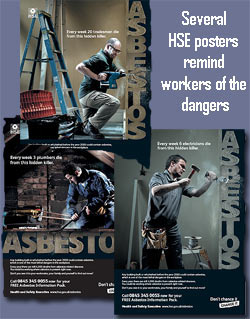 Everything you need to know about discovering asbestos in the home and at work, the health risks involved in exposure to damaged asbestos, and the safety legislation is covered in this website from the HSE. Click the pic!
Everything you need to know about discovering asbestos in the home and at work, the health risks involved in exposure to damaged asbestos, and the safety legislation is covered in this website from the HSE. Click the pic!
To quote from the TUC USR Asbestos Guide:
"
Asbestos has been the main cause of occupational ill health from about 1950
onwards and is still the greatest single work-related cause of death from ill health.
Past exposure is now responsible for about 4000 people dying from asbestosrelated
cancers every year.
This figure is expected to rise over the next ten years
and then decline.
These deaths are tragic for the people involved, causing immense pain and
suffering to them and their relatives, friends and colleagues."
TUC Hazards 2012 has a section on Asbestos which can be accessed here
BREAST CANCER
 Britain has one of the highest breast cancer death rates in the world. Whilst many think this a disease which only effects women, men also get breast cancer. The impact that breast cancer has on the lives of those men and women who are affected by it and on their families, friends and colleagues cannot be understated. It is simply devastating.
Britain has one of the highest breast cancer death rates in the world. Whilst many think this a disease which only effects women, men also get breast cancer. The impact that breast cancer has on the lives of those men and women who are affected by it and on their families, friends and colleagues cannot be understated. It is simply devastating.
The stats are frightening:
One woman in nine in the United Kingdom will develop breast cancer during her lifetime.
Each year 41,000 women are newly diagnosed with breast cancer and although survival rates are improving, on average 74 per cent of women are still alive five years later, too many women will die from the disease. On average 12,990 women die from breast cancer each year.
In 2000 there were 33,829 new registrations of breast cancer in women in England, around 30 per cent of all cancers in women.
80 per cent of all breast cancers occur in post-menopausal women (assuming average age of menopause is 50). However, approximately 8,000 pre-menopausal women are diagnosed with the disease each year..
Breast cancer in men is rare with around 250 cases each year, with about 90 men dieing each year from the disease.
Eye Sight Tests & DSE Working
People are still unclear as to what the regulations state in relation to free eyesight tests for those working on DSE equipment.
This guidance from the HSE issued in the form of LAC 16/3 to all Environmental Health Authorities, dispels the myths regarding eye test provision for employees.
DSE Users Eyesight Tests- LAC16/3

DSE MSD - Animated Advice
Homeworking
A guide to homeworking and the health and safety issues involved can be read here
Pandemics - Avian Flu
Avian Flu - HSE Guidance
Avian Flu - TUC Guidance
PROSTATE CANCER
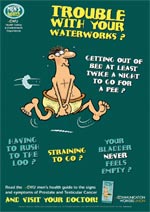 Prostate Cancer currently affects 16,000 men a year and is predicted to become the UK's most common cancer by 2018. Prostate Cancer usually affects older men - 95% of all patients are aged between 45 and 80.
Prostate Cancer currently affects 16,000 men a year and is predicted to become the UK's most common cancer by 2018. Prostate Cancer usually affects older men - 95% of all patients are aged between 45 and 80.
Testicular Cancer is the most common cancer to affect young men between the ages of 20-35 and its incidence has doubled in the past 20 years.
Download this CWU booklet.
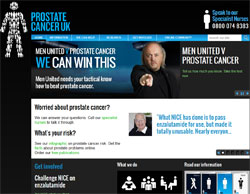 One of the UK's leading websites providing information about male cancers.
One of the UK's leading websites providing information about male cancers.
Stress At Work

Slips, Trips, and Falls
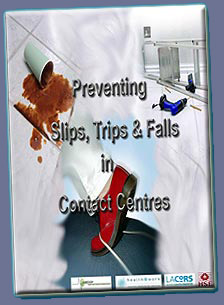 This is a common cause of injury in the workplace. In offcie and call centyre environments it is the major cause of injury next to WRULDs.
This is a common cause of injury in the workplace. In offcie and call centyre environments it is the major cause of injury next to WRULDs.
The HSE and the North West Contact Centres Project have issued the guidance below specifically on preventing slips trips and falls in contact centre environments. The advice, though applies to most office based working environments.
SMOKE FREE LEGISLATION GUIDANCE
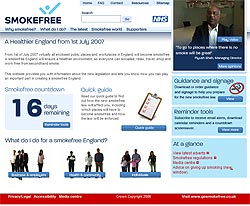 Not sure exactly what the legislation is all
about apart from banning smoking in the pub? Well, this new website will fill in that knowledge gap.
Not sure exactly what the legislation is all
about apart from banning smoking in the pub? Well, this new website will fill in that knowledge gap.
The Smoke Free legislation coming into force in July prohibits smoking in enclosed public and working spaces and is part of the Health Act 2006.
Click the pic to take you to the website
Stroke Association
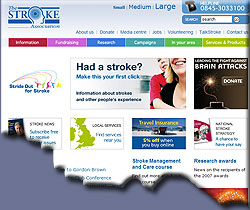 Every year an estimated 150,000 people in the UK have a stroke. Of all people who suffer from a stroke, about a third are likely to die within the first 10 days, about a third are likely to make a recovery within one month and about a third are likely to be left disabled and needing rehabilitation.
Every year an estimated 150,000 people in the UK have a stroke. Of all people who suffer from a stroke, about a third are likely to die within the first 10 days, about a third are likely to make a recovery within one month and about a third are likely to be left disabled and needing rehabilitation.
Stroke has a greater disability impact than any other medical condition. A quarter of a million people are living with long-term disability as a result of stroke in the UK.
The Stroke Association is the only UK wide charity solely concerned with combating stroke in people of all ages. It funds research into prevention, treatment and better methods of rehabilitation, and helps stroke patients and their families directly through its Rehabilitation and Support Services.
Click the pic to take you to the website
Men's Health Forum
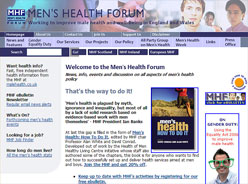 The Men’s Health Forum, which was founded in 1994, is an independent body that works with a wide range of individuals and organisations to tackle this problem.
The Men’s Health Forum, which was founded in 1994, is an independent body that works with a wide range of individuals and organisations to tackle this problem.
Now well-established with an active membership, we work for the development of health services that meet men’s needs and to enable men to change their risk-taking behaviours. Our members, partners, staff and executive officers bring a wealth of experience in healthcare, media, business and grassroots activity.
Our vision is a future in which all boys and men in England and Wales have an equal opportunity to attain the highest possible level of health and well-being.
Click the pic to take you to the website
Long Working Hours Culture
 The TUC's It's About Time campaign aims to put long hours and work/life balance at the top of the workplace agenda.
The TUC's It's About Time campaign aims to put long hours and work/life balance at the top of the workplace agenda.
Long hours, greater pressure of work, flexibility that only suits the employer and stress are the biggest problems in today’s workplace.
We don’t just need to change the law. Attitudes and culture have to change as well. But the law sends a powerful signal. Ending the opt-out would mean a 48-hour limit would apply in almost every workplace.
Do not underestimate the effects Britain's long working hours culture is having upon health & safety in the workplace. One of the major causes of work related stress is the long hours we work.
Are You At Risk Of Diabetes?
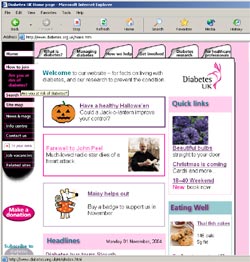 Spotting diabetes early means that it can be treated and the risk of developing the serious complications can be greatly reduced.
Spotting diabetes early means that it can be treated and the risk of developing the serious complications can be greatly reduced.
If you think you might have diabetes, it is vital you take steps now.
Too many people develop life-threatening complications because their diabetes is diagnosed too late.
There are many misconceptions about diabetes being a ‘mild’ condition. But these misconceptions are potentially dangerous.
Voice Loss - Are You at Risk?
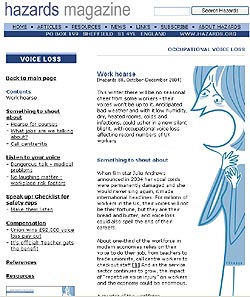 Every year the risk of voice loss in british industry increases. There are an estimated 1 million people working in contact centres alone, not to mention teachers, lecturers, actors, media and shop workers. All have on thing in common - their voice is their tool of trade.
Every year the risk of voice loss in british industry increases. There are an estimated 1 million people working in contact centres alone, not to mention teachers, lecturers, actors, media and shop workers. All have on thing in common - their voice is their tool of trade.
Voice loss (Dysphonia) is now becoming an issue of serious concern, and both the TUC and Hazards have identified this issue is significant enough to have it's own section with their websites.
Noise At Work
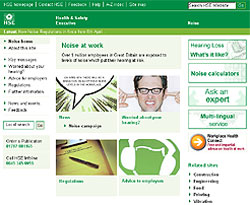 On April 6th 2006, the new Control of Noise at Work Regulations came into force. Prolonged exposure to noise at work can cause hearing loss, which is often permanent. Hearing loss caused by work is preventable, but once your hearing has gone, it won't come back.
On April 6th 2006, the new Control of Noise at Work Regulations came into force. Prolonged exposure to noise at work can cause hearing loss, which is often permanent. Hearing loss caused by work is preventable, but once your hearing has gone, it won't come back.
The Health and Safety Executive is working in partnership with businesses to find practical solutions to noise risks at work, to help protect everyone's hearing. Noise solutions can often be surprisingly cost-effective and easy to implement.
Business benefits include lower sickness absence, lower staff turnover, improved productivity and safety, enhanced reputation, and lower risk of legal action.
Health and Safety for Disabled Workers
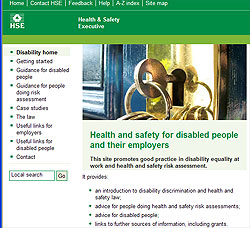 The HSE has lanched new disability health and safety guidance, intended to promote good practice in disability equality at work and health and safety risk assessment.
The HSE has lanched new disability health and safety guidance, intended to promote good practice in disability equality at work and health and safety risk assessment.
Additionally guidance in the form of a pdf document, written by the Disbaility Rights Commision and the HSE, has also been launched and is available on the site or direct from here.
The document is in the 'easyread' format ensuring it is accesable to those who are sight impaired and shows how employers and disabled workers can work together to make everyone safer.
Migraine Advice
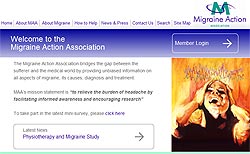 The Migraine Action Association bridges the gap between the sufferer and the medical world by providing unbiased information on all aspects of migraine, its causes, diagnosis and treatment.
The Migraine Action Association bridges the gap between the sufferer and the medical world by providing unbiased information on all aspects of migraine, its causes, diagnosis and treatment.
MAA’s mission statement is “to relieve the burden of headache by facilitating informed awareness and encouraging research”
Download Migraine Advice - DSE/ Flourescent Lighting from the E-Library by clicking on the link and selecting category 'Display Screen equipment'
Tinnitus Advice
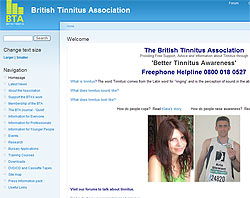 Tinnitus is the name given to the condition of noises 'in the ears' and/or 'in the head' with no external source. Tinnitus noises are described variously as ringing, whistling, buzzing and humming.
Tinnitus is the name given to the condition of noises 'in the ears' and/or 'in the head' with no external source. Tinnitus noises are described variously as ringing, whistling, buzzing and humming.
The noise/s may be heard in one ear, both ears or in the middle of the head or it may be difficult to pinpoint its exact location. The noise may be low, medium or high-pitched.
There may be a single noise or two or more components. The noise may be continuous or it may come and go.
The British Tinnitus Association (BTA)
Since becoming an independent charity in 1991, the BTA has grown immensely. It now employs seven members of staff in Sheffield as well as volunteers and publishes over 30 information sheets and booklets on tinnitus and related subjects for lay and professional people. Services provided are free.
The British Tinnitus Association is supported by a team of eminent professional advisers, all of whom are tinnitus specialists.
Personal Safety
 Suzy Lamplugh Trust is acknowledged as the leading authority on personal safety. Their work is based on practical experience, helping to develop effective strategies to reduce risk and improve personal safety. The Trust is frequently consulted by government departments.
Suzy Lamplugh Trust is acknowledged as the leading authority on personal safety. Their work is based on practical experience, helping to develop effective strategies to reduce risk and improve personal safety. The Trust is frequently consulted by government departments.
They also collaborate with the police on initiatives designed to reduce the fear of crime and are members of Project Sapphire which aims to improve rape investigation and victim care. Safety when travelling abroad has long been a concern of Suzy Lamplugh Trust; they are longstanding members of the Foreign and Commonwealth Office’s Know Before you Go campaign.
Well-being of Women
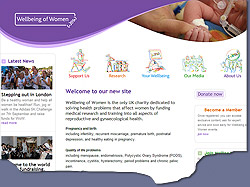 Wellbeing of Women is the only UK charity dedicated to solving health problems that affect women by funding medical research and training into all aspects of reproductive and gynaecological health.
Wellbeing of Women is the only UK charity dedicated to solving health problems that affect women by funding medical research and training into all aspects of reproductive and gynaecological health.
They are also unique in their commitment in encouraging young medical students and midwives to pursue a career in obstetrics and gynaecology.
Every year Wellbeing of Women helps up to 15 medical and midwifery students with its “Student Elective Bursaries”. The bursaries provide individuals with funds to travel abroad and experience working in reproductive and gynaecological healthcare as part of their university course. They are dedicated to improving the lives of women and their families by raising funds for better research and supporting the professionals who diagnose and treat these women.
Working In Flooded Areas
Advice has been issued by the CWU's Health and Safety department.
Download it here
Manual Handling
HSE Booklet on Manual Handling: includes recommended maximum wieght chart for male and females






















